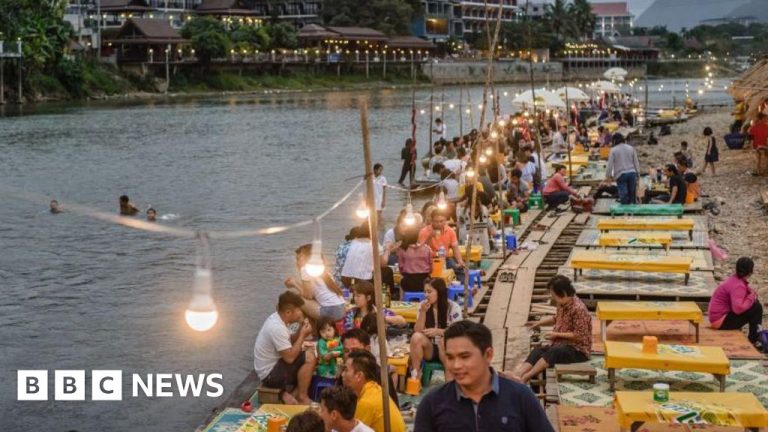Getty Images
Towns like Vang Vieng in Laos – where the fatal poisonings took place – are known stops on hiking trails across Southeast Asia.
Suspected methanol poisoning from contaminated drinks is believed to have killed five tourists at a Laos holiday town over the past fortnight.
A British woman, an Australian woman, an American and two Danish nationals have died, while another Australian woman remains seriously ill in hospital. The deaths are still under police investigation, but reports and online accounts from other tourists suggest they may have consumed drinks containing methanol, a deadly substance often found in moonshine.
Methanol poisoning has long been a well-known problem in Southeast Asia, particularly in poorer countries along the Mekong River.
But despite warnings from foreign governments about alcohol consumption in these places, there is still little awareness among backpackers.
Tasteless and colorless, methanol is difficult to detect in drinks and victims usually do not immediately see the symptoms of poisoning.
And in countries like Laos – one of the poorest and least developed in Asia – the problem is that alcohol suppliers exploit an environment where laws are weakly enforced and there are virtually no no regulations in the food and hospitality sectors.
What is methanol poisoning?
Methanol is a toxic alcohol used in industrial and household products such as paint thinner, antifreeze, varnish and photocopier fluids.
It is colorless and has an odor similar to ethyl alcohol, the chemical found in alcoholic beverages.
But methanol is dangerous for humans and drinking just 25 ml of it can be fatal.
It may take up to 24 hours before victims begin to show signs of illness, including: nausea, vomiting, and abdominal pain which may escalate into hyperventilation and breathing problems.
If left untreated, mortality rates often range between 20 and 40 percent, depending on the concentration of methanol and the amount ingested, according to the international medical association Médecins Sans Frontières (MSF), which tracks the number of outbreaks. in the world.
But if poisoning is diagnosed quickly enough, ideally within the first 30 hours, treatment can alleviate some of the more serious effects.
How common is the problem in Southeast Asia?
Asia has the highest prevalence of methanol poisoning in the world, according to the MSF database.
This is a problem that often affects poorer countries: epidemics are common in Indonesia, India, Cambodia, Vietnam and the Philippines.
Indonesia is considered a hotspot: it has reported the highest number of incidents over the past two decades, according to MSF, largely due to the widespread production and consumption of contraband alcohol.
Towns like Vang Vieng in Laos, where the fatal poisonings took place, are known stops on hiking trails across Southeast Asia. The city's economy relies on tourism, with streets filled with bars, restaurants and hostels that welcome visitors.
But in Laos, law enforcement is under-resourced and there are few regulations regarding food and alcohol standards. There is also a home-brewed alcohol industry, which can lead to accidental poisonings.
Producers also make counterfeit drinks by making products containing methanol instead of ethanol because it is cheaper, local observers say.
“There is an unscrupulous producer adding methanol to their drinks because it is cheaper – it is used to create a stronger-looking drink or to make lower-quality alcoholic drinks appear stronger powerful,” a Western diplomat from the region told the BBC. They also said methanol poisonings were being reported to consulates in the region.
However, a lack of data means it is difficult to quantify the extent of contamination and where contaminated drinks are entering the supply chain.
“I don't think it's nefarious bar owners who are going out of their way to poison tourists – it's not good for them or their industry either,” the diplomat said.
“It’s more on the production side – there’s low education, low regulation and people cutting corners.”
What can we do about it?
The diplomat also said that the risks of contraband alcohol are well known to tourism operators and embassies, but a major campaign is needed to inform tourists.
“This horrific event will likely help educate people, but will not solve the root cause of the problem,” they added.
Several Western governments this week updated their advice on the dangers of alcohol in Southeast Asia on their consulate and travel pages.
Some activists have already tried to draw attention to the dangers. Australian Colin Ahearn runs a Facebook page called “Don't Drink Spirits in Bali” where he warns against mixed drinks like cocktails or drinks made from opened bottles of spirits.
He told Australian media earlier this week that his page received weekly reports about methanol poisoning in Southeast Asia.
Addressing this topic, the Western diplomat told the BBC that it would be difficult for people to protect themselves unless they completely abstain from alcohol on vacation, as it is unrealistic for tourists to check the original source of all their alcoholic beverages.

